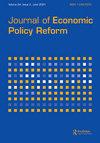国民化、救助和效率
IF 3.2
3区 经济学
Q1 DEVELOPMENT STUDIES
引用次数: 0
摘要
我们建立了一个理论模型,其中有公共企业、私营企业和政府。当企业资不抵债时,政府可以通过救助或国有化进行干预。只有当企业破产带来社会成本时,政府才会进行干预。在这种情况下,我们分析政府干预如何影响配置效率和生产效率。在无利可图的投资后将私人公司收归国有,尽管私有制仍能提高配置效率。企业管理者和员工选择的努力水平也受到政府干预可能性的影响,从而降低了私营企业的生产效率优势。本文章由计算机程序翻译,如有差异,请以英文原文为准。
Nationalizations, bailouts and efficiency
ABSTRACT We develop a theoretical model in which there are public and private firms and a government. When firms become insolvent, the government can intervene with bailouts or nationalizations. The government only intervenes when the bankruptcy of a firm entails social costs. In this setting, we analyze how government interventions affect allocative and productive efficiency. Nationalizations of private firms after unprofitable investments lead to increased allocative efficiency despite private ownership. The effort level chosen by the managers and employees working for a firm is also affected by the possibility of government interventions, reducing the productive efficiency advantage of private firms.
求助全文
通过发布文献求助,成功后即可免费获取论文全文。
去求助
来源期刊

Journal of Economic Policy Reform
Multiple-
CiteScore
6.60
自引率
0.00%
发文量
14
期刊介绍:
The Journal of Economic Policy Reform focuses on the analysis of economic policy reform. The journal draws upon what lessons can be learned from the successes and failures of countries undertaking reforms and how existing theories can be developed to shed light on positive as well as normative aspects of the reform process. The Journal of Economic Policy Reform encourages work from economists and political economy analysts on policies to promote growth and reduce poverty, intellectual property rights, aid versus trade, debt and debt relief, taxation and social security systems, surveys of key reform issues, as well as on corruption, democracy, emerging markets and the role of multilateral institutions.
 求助内容:
求助内容: 应助结果提醒方式:
应助结果提醒方式:


